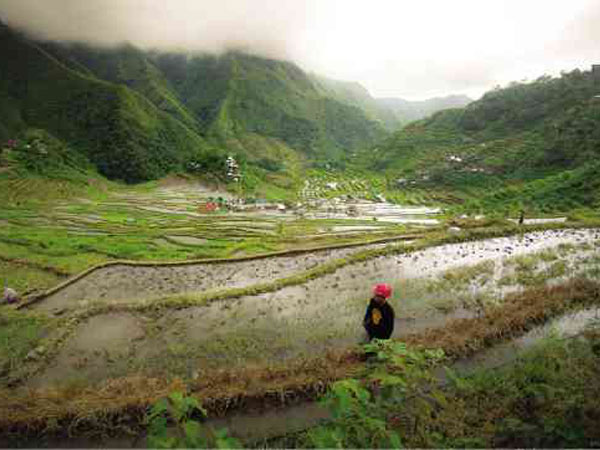Ifugao rejects plan to build roads to terraces

AN IFUGAO farmer inspects one of his newly watered rice paddies at the rice terraces of Batad in Banaue, Ifugao. RICHARD BALONGLONG/INQUIRER NORTHERN LUZON
BAGUIO CITY—The provincial government of Ifugao has asked the Department of Tourism (DOT) to stop building a road that leads to its most picturesque cluster of rice terraces in Banaue town.
Instead, Ifugao Gov. Denis Habawel said the government would build a road leading to the top of the mountain holding these terraces, where tourists can view the centuries-old farms far from the local community.
Habawel said these proposed mountain top view decks may even offer tourists a kilogram of certified terrace rice for as much as P300 because of a plan to improve the value of palay grown only once a year on the terraces.
By making Ifugao’s “tinawon” rice highly valuable, the government may finally convince younger generations to return to abandoned farms and resume planting, Habawel said.
Many of the terraces have suffered erosion in the past few years owing to extreme weather, but the Department of Agriculture (DA) said many of the damaged terraces also have been neglected, as young Ifugao families gave up farming for more lucrative jobs in cities or abroad.
Habawel discussed the terraces on the sidelines of the July 30-31 Cordillera Disaster Risk Reduction and Management Summit here.
“I’ve sat down with [Purificacion Molintas, Cordillera director of the DOT]… We are modifying the plans for tourism roads,” he said.
The discussion came following concerns over a concrete road project in Batad, which hosts the amphitheater-shaped Batad rice terraces, one of the most visited rice terraces clusters in the province.
The United Nations Educational, Scientific and Cultural Organization had enshrined the Ifugao rice terraces as a World Heritage Site in 1995.
Portions of the Batad terraces had eroded due to recent storms and heavy rain, scarring its landscape.
The DA financed repairs there, hiring community experts to rebuild the stone foundations of ancient farms.
But the DA, in February, expressed concern about the DOT’s alternative road that was designed to ease access to the Batad terraces.
“It does not make sense to bring a paved road into the village of Batad because the roads would increase the number of people coming in. The village is not ready for that kind of intervention,” Habawel said.
“So I begged the [officials of the Department of Public Works and Highways, which is constructing the DOT-financed road] to reconsider their plan,” he said.
Instead of bringing the road to Batad, I suggested [that the government] bring that road to the top of the mountain, which could provide a very good view of the terraces and the village,” he said.
Habawel said the mountain top could serve as a new view deck, complete with a picnic area and huts that tourists can use on a time-share arrangement. A parking area would be built there, he said.
Habawel said this model could be replicated in all terraces frequented by tourists, many of them European backpackers.
Batad families offer huts to tourists near their homes. To reach the terraces today, tourists negotiate steep and slippery rock trails, and would need to weave through private compounds.
Under the new plan, Habawel said tourists need not visit communities which are forced to perform “choreographed dancing” each time they toured the villages.
He said tourists would be provided real-time information about the villages from the view deck, indicating which community is performing a ritual burial or which village is celebrating due to a wedding.
More importantly, tourists are provided information about periods when the community joins hands in repairing terrace walls or help each other harvest rice, he said.
As an incentive, the Ifugao government would offer tinawon rice to tourists being the terraces’ “best souvenir,” a project that would encourage “everyone to return to their farms,” Habawel said.
This tourism model would be put out as a public-private partnership arrangement by the end of the year. Vincent Cabreza, Inquirer Northern Luzon














